人教版九年级英语精品学案 第十三单元
- 格式:doc
- 大小:92.00 KB
- 文档页数:8
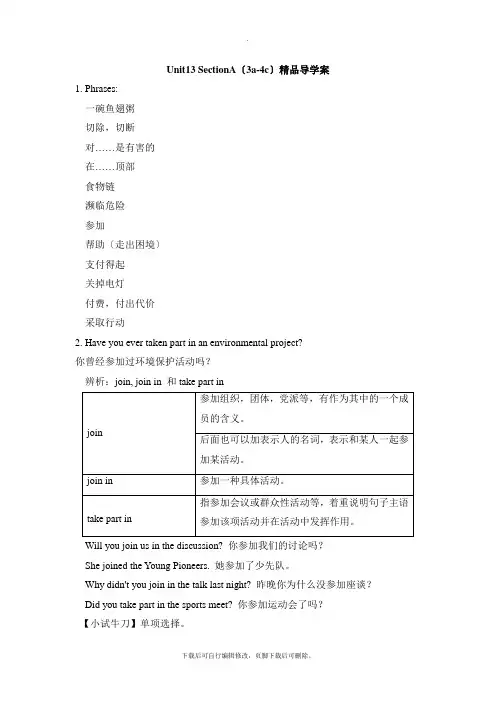
Unit13 SectionA〔3a-4c〕精品导学案1. Phrases:一碗鱼翅粥_____________________切除,切断___________________对……是有害的____________________在……顶部____________________食物链_______________________濒临危险_________________________参加_____________________帮助〔走出困境〕___________________支付得起____________________关掉电灯___________________付费,付出代价____________________采取行动____________________2. Have you ever taken part in an environmental project?你曾经参加过环境保护活动吗?辨析:join, join in 和take part inWill you join us in the discussion? 你参加我们的讨论吗?She joined the Young Pioneers. 她参加了少先队。
Why didn't you join in the talk last night? 昨晚你为什么没参加座谈?Did you take part in the sports meet? 你参加运动会了吗?【小试牛刀】单项选择。
①—Have you _____ a club?—Yes, I’m in a swimming club and I often _____ the swimming training.A. joined; take part inB. joined; joinC. taken part in; joinD. taken part in; join in②—We’re going for a picnic. Would you like to____ us? —Why not? Let’s go!A. attendB. joinC. join inD. take part in③—Are you going to _____ any of the events?—Yes. Maybe long jump and high jump.A. take part inB. joinC. attendD. join in3. We can’t afford to wait any longer to take action!我们不能再等了,要采取行动了。
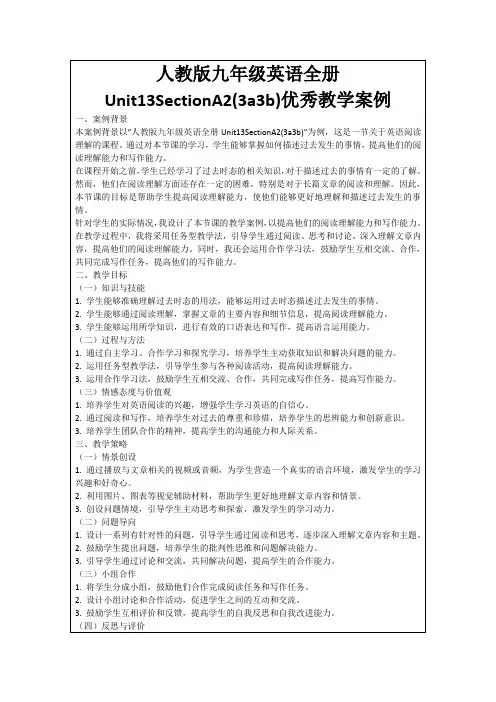
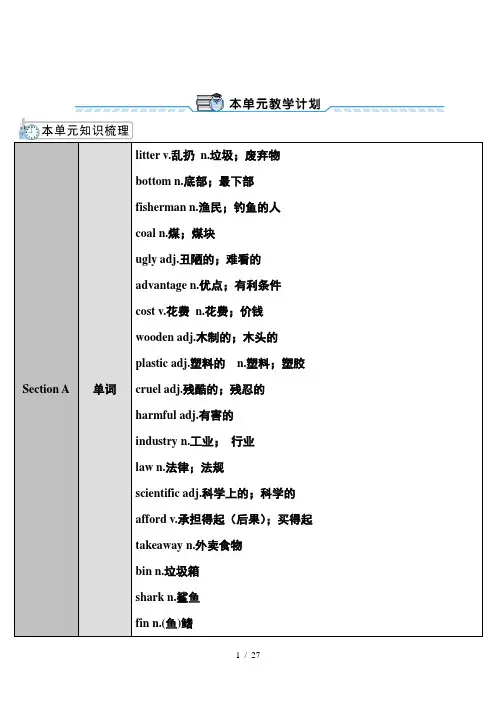
Section A 单词litter v.乱扔n.垃圾;废弃物bottom n.底部;最下部fisherman n.渔民;钓鱼的人coal n.煤;煤块ugly adj.丑陋的;难看的advantage n.优点;有利条件cost v.花费n.花费;价钱wooden adj.木制的;木头的plastic adj.塑料的n.塑料;塑胶cruel adj.残酷的;残忍的harmful adj.有害的industry n.工业;行业law n.法律;法规scientific adj.科学上的;科学的afford v.承担得起(后果);买得起takeaway n.外卖食物bin n.垃圾箱shark n.鲨鱼fin n.(鱼)鳍复习现在进行时、现在完成时和被动语态等的用法。
以“保护环境”为主题,运用本课相关句型与他人展开讨论;能向大家介绍有哪几种污染类型,怎样回收利用废弃物品等。
体会到保护环境的重要性,学会保护大自然、保护地球,从身边的小事做起,号召大家参与到保护环境的行动中来。
【课时建议】本单元建议5课时Section A (1a~2d)……………………………………………………………………………………1课时Section A (3a~4c)……………………………………………………………………………………1课时Section B (1a~1e)……………………………………………………………………………………1课时Section B (2a~2e)……………………………………………………………………………………1课时Section B (3a~3b)……………………………………………………………………………………1课时词汇短语:主要采用多媒体及图片展示法。
基本句子:采用图片展示及交际法(利用多媒体展示两人进行交际时的情景)。
语法:复习现在进行时、现在完成时和被动语态——采用“巧记歌诀”记忆法。
被动语态的用法谁的动作不知道,说出谁做没必要;承受之人需强调,被动语态莫忘了。
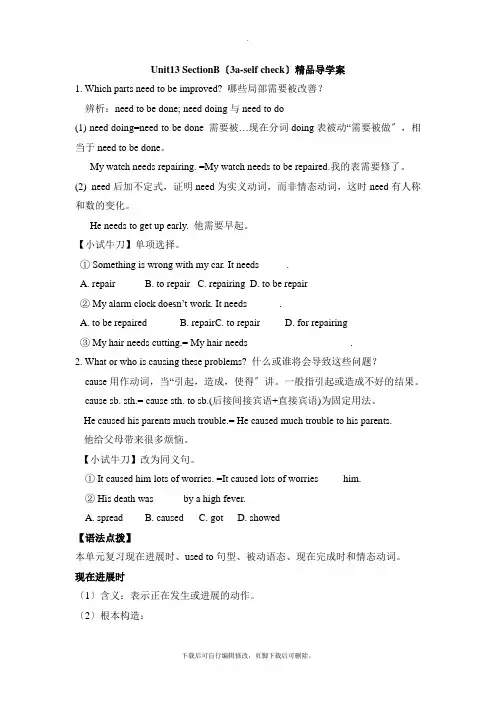
Unit13 SectionB〔3a-self check〕精品导学案1. Which parts need to be improved? 哪些局部需要被改善?辨析:need to be done; need doing与need to do(1) need doing=need to be done 需要被…现在分词doing表被动“需要被做〞,相当于need to be done。
My watch needs repairing. =My watch needs to be repaired.我的表需要修了。
(2) need后加不定式,证明need为实义动词,而非情态动词,这时need有人称和数的变化。
He needs to get up early. 他需要早起。
【小试牛刀】单项选择。
① Something is wrong with my car. It needs _____.A. repairB. to repairC. repairingD. to be repair② My alarm clock doesn’t work. It needs ______.A. to be repairedB. repairC. to repairD. for repairing③ My hair needs cutting.= My hair needs ______ ______ _______.2. What or who is causing these problems? 什么或谁将会导致这些问题?cause用作动词,当“引起,造成,使得〞讲。
一般指引起或造成不好的结果。
cause sb. sth.= cause sth. to sb.(后接间接宾语+直接宾语)为固定用法。
He caused his parents much trouble.= He caused much trouble to his parents.他给父母带来很多烦恼。
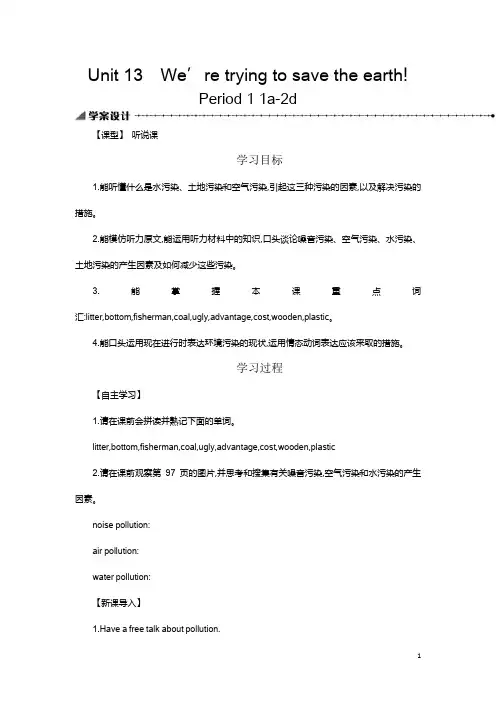
Unit 13We’re trying to save the earth!Period 1 1a-2d【课型】听说课学习目标1.能听懂什么是水污染、土地污染和空气污染,引起这三种污染的因素,以及解决污染的措施。
2.能模仿听力原文,能运用听力材料中的知识,口头谈论噪音污染、空气污染、水污染、土地污染的产生因素及如何减少这些污染。
3.能掌握本课重点词汇:litter,bottom,fisherman,coal,ugly,advantage,cost,wooden,plastic。
4.能口头运用现在进行时表达环境污染的现状,运用情态动词表达应该采取的措施。
学习过程【自主学习】1.请在课前会拼读并熟记下面的单词。
litter,bottom,fisherman,coal,ugly,advantage,cost,wooden,plastic2.请在课前观察第97页的图片,并思考和搜集有关噪音污染,空气污染和水污染的产生因素。
noise pollution:air pollution:water pollution:【新课导入】1.Have a free talk about pollution.2.What can cause each kind of pollution?【新知呈现】Ask students to look at the pictures in1a and ask them two questions:What can you see in each picture?What kind of pollution does it cause?【新知学习】Teacher can ask students the following question:What else can cause each kind of pollution?Then ask students to fill in the chart below.【拓展提升】Write a passage about different kinds of pollution.There are mainly four kinds of pollution.They are air pollution,noise pollution,water pollution and land pollution.The air is polluted because.There’s also some noise pollution.There are many causes,such as.And the water pollution is caused by.Some land is polluted because.【跟踪训练】根据句意用take,spend,pay或cost的适当形式填空1.This house us lots of money.2.My mother300yuan on her new dress.3.It usually me15minutes to walk home from my office.4.It is worth some time taking exercise every day.5.I1,000yuan for the new bike yesterday.【课堂练习】用动词的适当形式填空1.The river used to(be)really clean.2.There are no more fish for to catch(fisherman).3.Everyone should play a part in(clean)it up!ing(wood)chopsticks is bad for the environment.5.There are other(advantage)of bike riding.6.People are(throw)litter into the river.课堂小结学生先自主学习,再以四人一组形式展开讨论:1.本节课学习了哪些内容?2.对本节课还有哪些疑问?自我反思1.我的收获:Words and expressions:Sentences:.2.学习本节课后,我能用英语进行.3.我的易错点:.参考答案【跟踪训练】1.cost2.spent3.takes4.spending5.paid【课堂练习】1.be2.fishermen3.cleaning4.wooden5.advantages6.throwingUnit 13We’re trying to save the earth!Period 23a-4c【课型】阅读课学习目标1.能掌握词汇:重点词汇(cruel,harmful,industry,law,scientific,afford);认读词汇(shark,fin,chain,ecosystem,reusable,transportation);表达方式(be harmful to,at the top of,the food chain,take part in,turn off,pay for,take action).2.谈论珍稀动物的濒危原因及拯救措施。
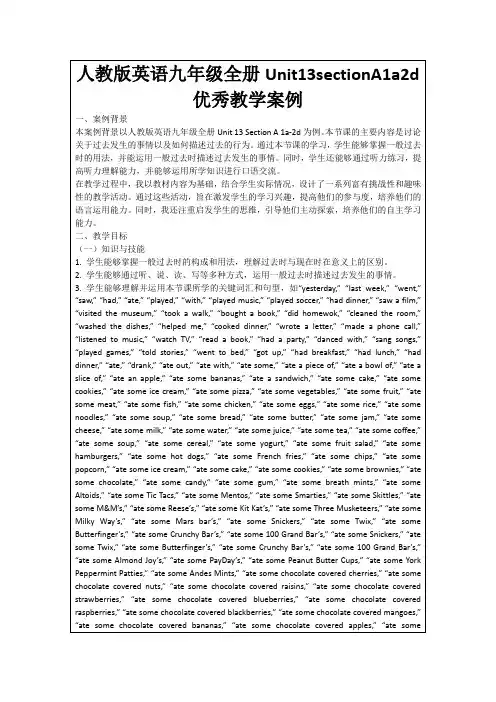
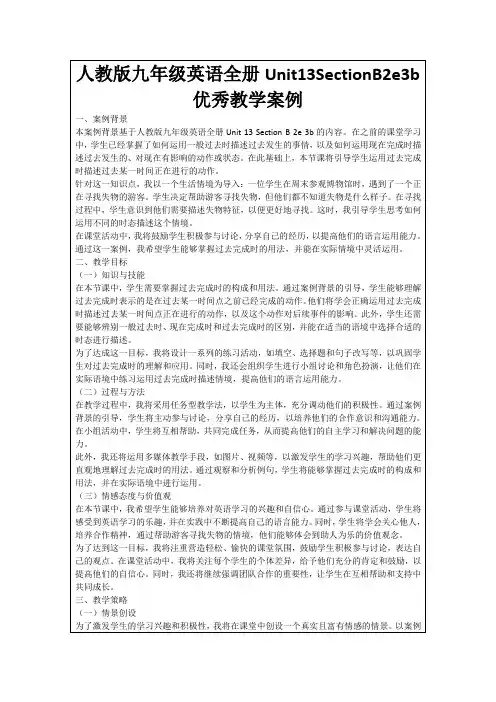
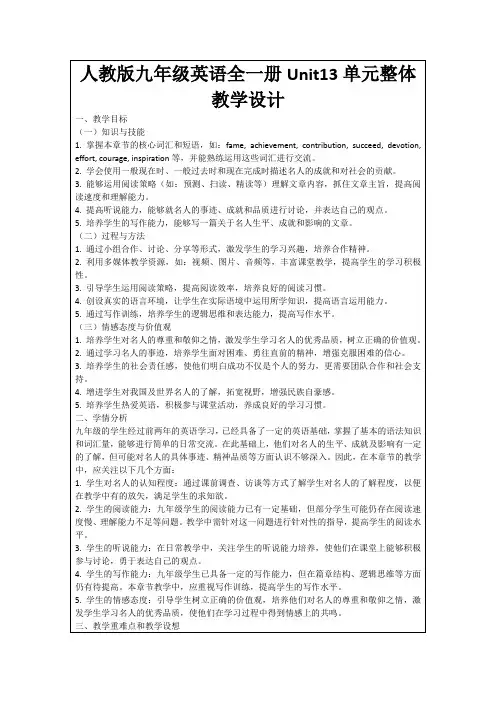
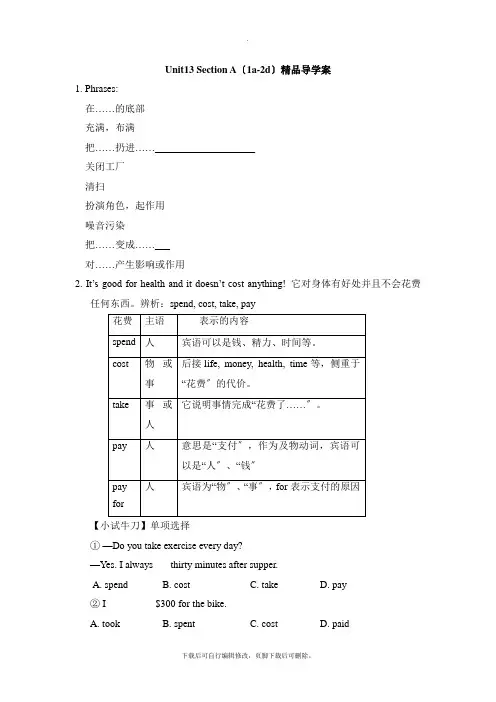
Unit13 Section A〔1a-2d〕精品导学案1. Phrases:在……的底部_____________________充满,布满___________________把……扔进……____________________关闭工厂____________________清扫_______________________扮演角色,起作用_________________________噪音污染_____________________把……变成……___________________对……产生影响或作用____________________2. It’s good for health and it doesn’t cost anything! 它对身体有好处并且不会花费任何东西。
辨析:spend, cost, take, pay【小试牛刀】单项选择①—Do you take exercise every day?—Yes. I always ___thirty minutes after supper.A. spendB. costC. takeD. pay② I _________ $300 for the bike.A. tookB. spentC. costD. paid③ The interesting book _____ me 10 yuan.A. spentB. tookC. paidD. cost3. To cut down air pollution, we should take the bus or subway instead of driving. 为了减少空气污染,我们应该乘坐公共汽车或者地铁,而不是开车。
cut down 意为“减少〞;是“动词+副词〞构造的短语,所带的宾语为名词时,宾语可位于down的前面或后面;为代词时,只能位于down前面。
You’d better cut the article down to about 2,000 words. 你最好能把这篇文章压到两千字左右。
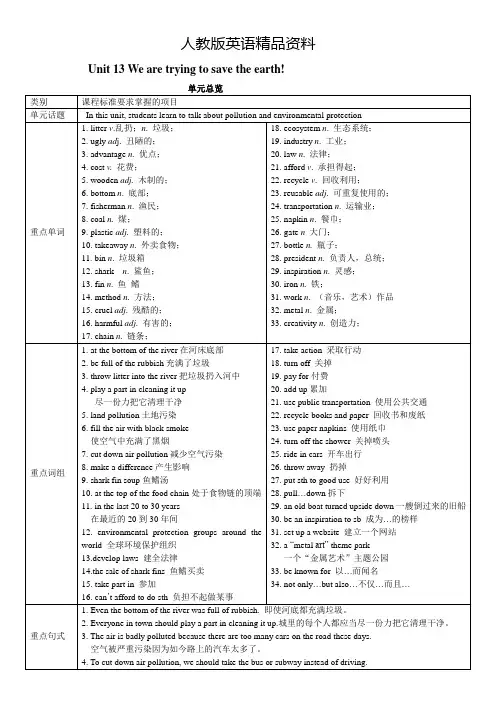
人教版英语精品资料Unit 13 We are trying to save the earth!课时分解第一课时Section A(1a ~ 2d)II. 课堂环节§自主学习方案【自学自查】根据汉语提示完成单词。
1. We should put up notice to stop from littering (乱扔)。
2. The teacher asked us to find a way to pickup the coins at the bottom (底部)of the bottle.3. There are no more fish for fishermen (渔夫)to catch in the river.4. We should take the paper bags to go shopping instead of the plastic (塑料)ones.5. Could you please tell us another advantage(优点)of riding bike to work?§课堂导学方案Step 1 情景导入(参考案例)用多媒体给学生播放一些有关环境污染的图片或视频,然后询问学生对环境污染的看法和观点。
Teacher:What kinds of pollutions do you know?What do you feel about the pollution?Students: I think there are____.① noise pollution②air pollution③waterpollution…环节说明:通过视频和课前的一个师生问答互动引入新课的话题Step 2 完成教材1a-1c的任务【操作案例】1. 要求学生翻开课本P97,迅速阅读1a部分的内容。
把方框中的单词按它们产生污染的类型写入相应的栏目中,并添加更多的单词。
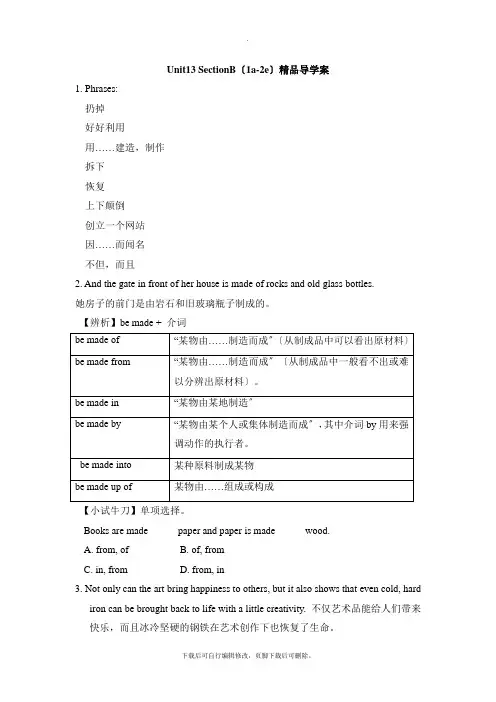
Unit13 SectionB〔1a-2e〕精品导学案1. Phrases:扔掉_____________________好好利用___________________用……建造,制作____________________拆下____________________恢复_______________________上下颠倒_________________________创立一个网站_____________________因……而闻名___________________不但,而且____________________2. And the gate in front of her house is made of rocks and old glass bottles.她房子的前门是由岩石和旧玻璃瓶子制成的。
【辨析】be made + 介词【小试牛刀】单项选择。
Books are made _____ paper and paper is made _____ wood.A. from, ofB. of, fromC. in, fromD. from, in3. Not only can the art bring happiness to others, but it also shows that even cold, hardiron can be brought back to life with a little creativity. 不仅艺术品能给人们带来快乐,而且冰冷坚硬的钢铁在艺术创作下也恢复了生命。
“not only …but also …〞是一个并列连词词组,其意思根本等于“both…and …〞。
使用not only … but also …时须注意的几点:(1) not only与but also后面所连接的词的词性必须对等:They completed the project not only punctually but also perfectly.他们不仅准时完成工程,而且完成得很出色。
安边中学九年级全学期英语学科导学稿执笔人:李晓龙总第 3 课时Task2 仔细阅读第二段,完成下面的句子。
Bad things happen to sharks when people cut off their fins.When people catch sharks, they _______ their fins and _______ the shark _______ into the ocean. Without a fin, a shark can no longer ________ and slowly _______. If sharks’numbers ________ too low, it will ________ danger to all ocean life.Task 3 仔细阅读第三段,完成下面的句子。
Some things that environmental protection groups have done:They __________ the public about "finning". They have even asked governments _____________ to stop the sale of shark fins.【训练案】一.Fill in blanks using proper forms of given words.1、I'll give the book to him as soon as he _______back(come).2、______ the baby _______crying yet? (stop)3、I don't know whether mother________ me to beijing next month.(take)4、She ________ on her coat and went out. (put)5、“What are they doing?”“They_______ ready for the sports meeting.” (get)6、The boy asked his mother________ him go and play basketball.(let)7、I’m sorry to keep you ________for a long time. (wait)8、It ______(take) him half an hour________ (finish) his homework yesterday.9、If it _______ an interesting film, we’ll see it tomorrow. (be)10、They usually _________(do) their homework after supper.11、Listen! who__________ (sing) in the next room now?12、_______ (be) your parents in shanghai last year?13、Mr. yu ________ (teach) us maths since 1982.14、They will have a trip (旅行) to the great wall if it ________ (not rain) tomorrow.15、Li Ming often________(listen) to the radio in the morning.反思栏。
Unit13 SectionA〔2a-2e〕精品教案◈rethink –think carefully about something again to see if changes should be made.e.g. Let’s rethink our decision to buy a car, considering that a car will only add to environmental pollution.◈reuse –use something again after it has been used.e.g. These plastic forks and spoons can actually be reused if you clean them properly.◈ recycle –do something to things that have been used so that they can be used again.e.g. This piece of paper looks a little different because it is recycled paper.2b. To provide Ss with practice in reading for general ideas and specific details.Any other ideas?Have Ss work in groups to discuss other ways of reusing and recycling thing.2c. To enable Ss to learn some key phrases used in the passage they have just read.Explaining the phrases: pull down, put to good use, build … out of, set up, known for2d. To get Ss to focus on prefixes and suffixes.◈ Prefix: a group of letters added to the beginning of a word to change the meaning of the worde.g. re+ thin rethinkun + usual unusual◈ Suffix: a group of letters added to the end of a word to change the part of speech. Work in groupsto discuss otherways of reusingand recyclingthing.Make upsentences usingthe phrases.Underline thewords in thepassage.单词的含义。
人教版英语九年级unit13单元教案一、教学内容及分析本单元教学主要围绕“感受Feelings”这个话题,谈论对某件事或物的看法,以及谈论事物对人的影响。
本单元一开始用音乐、图画、植物、电影等事或物对人的影响,引出本单元的话题和新目标语言,同时学习一些新的词汇和表达。
然后通过阅读有关“饭店科学”的文章,进一步学习新目标语言,谈论事物对人的感情的影响。
随着教学活动的深入,教材又安排了学习日常生活用品和广告等事物对人的影响,并帮助学生学会表达自己对事物的观点。
最后教材进一步升华到学习现实生活中为人处事的感受。
本单元所学习的知识点比较少,本单元主要学习运用make的用法,谈论事物对人的影响。
一些表示感受的形容词在前面学生已经学习过,所以用起来应该是比较简单的。
要求掌握How do you feel about loud music ? Loud music makes me tense .Loud music makes me want to dance .等句型。
学会运用这些句型表达对事物的感受和观点。
我将本单元的目标定位为:1、掌握表示感受的一些形容词的用法。
(interested、happy 、sad 、excited、relaxed、bored、energetic 、nervous 、sick 、comfortable 、angry 、tens 、annoyed 、healthy、hungry、pleased 、upset 、scared 、sleepy、awful 、stressed out)2、主要掌握关于make一些句型:make sb. + adj. ; make sb. + do sth. ; 在被动语态中还原动词不定式符号to 。
根据教材的编排体系,我将本单元分为三大板块(即听说练习、读写练习、巩固运用)。
第一二课时设计以听说为主,主要练习表示感受的形容词的用法以及本单元的重要语法make句型的运用。
九年级英语Unit 13 We’re trying to save the earth!知识导航语言目标谈论污染和环境保护。
Section A重点单词1. litter v.乱扔n.垃圾2. bottom n.底部3. coal n.煤4. ugly adj.丑陋的5. cost v.花费n.花费6. wooden adj.木制的(wood n.木材)7. plastic adj.塑料的n.塑料8. method n.方法9. cruel adj.残酷的10. harmful adj.有害的(harm n.害处)11. industry n.工业12. law n.法律13. afford v.承担得起重点短语1.make a difference 起作用;有影响2. take part in 参加3. turn off 关掉4. pay for 付费;付出代价5. cut down 减少6. lead to 导致7. hear of 听说8. cut off 切除重点句型1.We’re trying to save the earth. 我们在努力拯救地球。
2. The rive used to be so clean. 这河流过去是如此的清澈。
3. The air is badly polluted. 空气被严重污染。
4. The method is not only cruel, but also harmful to the environment. 这种方法不仅残酷,而且对环境也有害。
Section B重点单词1. recycle v.回收利用2. gate n.大门3. bottle n.瓶子4. president n. 负责人5. work n.作品6. metal n.金属重点短语1. throw away 扔掉2. put sth. to good use 好好利用3. put … down 拆下4. upside down 上下颠倒5. bring back 恢复重点句型1. And the gate in front of her house is made of rocks and old glass bottles. 她房子的前门是由岩石和旧玻璃瓶子制成的。
Unit 13 We’re trying to save the earth!导学案【学习目标】(一)知识与能力1.熟练掌握并灵活运用本单元词汇短语以及句型和语法点。
2.能听懂关于环境污染和环境保护的听力材料。
3.能正确运用现在进行时态,used to结构,现在完成时态,被动语态和情态动词谈论环境污染和环境保护。
(二)过程与方法1.通过短视频展示现实生活的多种污染形式和国家生态保护区,让学生对比环境保护前后的差异,认识到污染对于生态的危害。
2.通过小组讨论学生自己在现实中遇到的污染问题,以及自己如何看待它。
3.通过阅读文章材料和网络搜索生态环保类阅读材料,把握材料中心思想,提高自身阅读技巧。
4.通过参加社会实践来提高学生环保实践行动力,让语言学习具有现实性。
(三)情感态度与价值观1.让学生体会到保护自然环境、保护动物、保护地球的重要性,并倡导我们保护地球母亲。
2.培养学生良好的生活习惯,爱我家园人人有责,自觉爱护身边的环境,争做环保先锋。
3.通过谈论环境污染,学生能培养自己的环保意识。
做到:保护环境,从我做起,从小事做起。
【学习重难点】1.重点:掌握本单元和生态环保相关的核心词汇短语,以及语法点。
2.难点:阅读科普类文章和掌握相关专业词汇,正确运用现在进行时态,used to结构,现在完成时态,被动语态和情态动词谈论环境污染和环境保护。
【学习过程】SECTION A(一)自主学习1.通过多媒体向学生展示一些环境污染的图片,并要求学生用所知词汇描述这些污染类型,让学生巩固词汇和导入单元主题。
2.让学生听录音1b部分,结合1a部分图片,讨论污染类型完成1a和1b 的语言任务。
3.让学生听录音2a部分,完成2a和2b部分语言任务。
4.学生自主快速默读短文,熟知大意,并完成课本3a和3b的任务。
5.语法聚焦现在进行时,被动语态,现在完成时和情态动词的用法,在理解的基础上完成4a和4b板块的巩固练习。
(二)合作探究1.根据1a和1b的内容,通过分小组角色模拟1c部分对话,对环境污染类型展开讨论,各小组总结自己的观点,锻炼学生听说能力,老师最后予以点评。
Unit 13 Rainy days make me sad.单元重点知识导航Unit 13102 lagoon n. 泻湖;环礁湖104 scientific adj. 科学的104 therefore adv. 因此;所以104 pink adj. 粉红色的104 lighting n. 光线;照明104 hard adj. 坚硬的;坚决的104 serve v. (为…)服务;招待;端上(饭菜等)104 fair adj. 公平的;公道的104 campaign n. 运动104 endangered adj.有绝种危险的;濒临灭绝的105 slogan n. 标语;口号105 mysterious adj. 神秘的;不可思议的105 shiny adj. 有光泽的;发亮的105 skin n. 皮皮肤105 product n. 产品105 lookout n. 前景;远景105 beauty n. 美;美貌105 keep out (使)不进入;(使)留在外面106 stardust n. 星团;幻觉106 advertising n. 广告;广告活动;广告业106 pros and cons 赞成与反对;正面和反面106 aim v. 瞄准;对准106 aim at 瞄准;针对;致力于;旨在106 specifically adv. 特定地;特殊地;明确地106 instance n. 例子;实例106 for instance 例如;比如106 list v. 列出;列举;列表106 confusing adj. 令人困惑的;含糊不清的106 misleading adj. 令人误解的;骗人的truth 真实;真相at times 有时;偶尔to start with 首先tense 紧张的;焦虑的home-made 自制的;DIYschoolbag 书包purple 紫色的purse 钱包;女用小包guilty 内疚的;有罪的taste 品味;审美力saying 格言警句;谚语thought 思想;考虑count 有价值;重要(A) 词汇部分1. scientific adj.科学的→science n.科学→scientist n.科学家2. shiny adj.有光泽的,发亮的→shine v.发光,照耀3. beauty n. 美,美貌→beautiful adj. 漂亮的,美丽的→beautifully adv. 漂亮地,美丽地4. truth n. 事实,真相→true adj.真的→truly adv.真实地tell the truth 说真话5. taste n. & v. 口味,审美力,尝(后接形容词,不接副词) →tasty adj. = delicious可口的,美味的6. saying n. 格言,谚语,警句→say v. 说7. thought n. 思想,想法,考虑,关心→think v.思考,认为(B) 短语部分1. keep out (使)不进入,(使)留在外面keep on (v-ing) 继续做2. aim at 瞄准,针对,旨在,致力于3. for instance =for example =such as 例如4. make a list of = list列……的表5. at times = sometimes 有时,偶尔at other times 在其它时候/场合,平常at the same time 同时by the time 在那时6. to start with = to begin with 首先7. have fun with 与……过得高兴have fun v-ing sth. =enjoy v-ing sth.高兴做某事8. so…that 如此……以致于so that 为了,以便9. keep sb. v-ing 让某人做……(保持某状态)keep sb. from v-ing sth. = stop sb. (from) v-ing sth. 让某人别做某事keep sb. away from让……远离10. tell the truth /lie 说真话/ 撒谎11. learn from 向……学习learn much /a lot about sth. /sb. 对某事/某人了解很多learn …by heart 背诵,记住12. look /taste /sound /feel /grow… adj. 看(尝, 听)起来/觉(长)得…..13. to be honest = honestly 老实说,说实在地14. listen to 听……,收听listen for 倾耳听,等着听15. jump out of 从……跳出来jump off 跳离the long /high jump 跳远/高1. make sb. adj. /v sth. 让某人怎么样做某事Waiting for her made me angry.等她使我生气。
Sad movies don’t make me cry.悲伤的电影没有让我哭。
注意:如果作“制造”时,后面的补语接带的不定式。
如:The farmers make something to protect the environment. 农民们做些事来保护环境。
2. would rather v sth.宁愿做某事I’d rather go to the Blue Lagoon Restaurant because I like to listen to quiet music while I’m eating.我宁愿去Blue Lagoon餐馆,是因为我在吃饭时喜欢听宁静的音乐。
3. How do you feel about sth? = How do you like sth.? = What do you think of sth.?你觉得某物如何?How do you feel about pollution?你觉得污染如何?4. lead sb. to v sth. 领着某人做某事At times an ad can lead you to buy something you don’t need at all.偶尔一则广告会引导你购买你根本不要的东西。
5. … so adj./adv. that clause.如此……以致于… so that clause为了……,以便于……It was so sad that it make us cry.如此悲伤,以致于让我要哭。
they can help you to compare two different products so that you can buy the one you really need.它们(广告)可以帮你对两种不种的产品进行比较,以便于你能买到你真正需要的东西。
6. prefer to v sth.更喜欢做某事prefer v-ing sth.更喜欢做某事prefer to v sth rather than v sth. = would v sth. rather than v sth.宁愿/愿意做某事而不愿做某事prefer v-ing sth. to v-ing sth. = like v-ing sth. instead of v-ing sth. 喜欢做某事,而不喜欢做某事I prefer to receive a gift that counts.我更喜欢收到有意义的礼物。
He prefers listening to gentle songs.他更喜欢听柔和的音乐。
I prefer to stay at home rather than go out. = I would rather stay at home than go out.我宁愿呆在家也不愿出去。
She prefers walking to school to taking the bus to school. = She likes walking to school to taking the bus to school. 她喜欢走路上学,而不喜欢乘车上学。
7. mind if …/v-ing …如果/做…….介意I don’t mind if it’s something I don’t need.如果是我不需要的东西,我不会介词。
Do you mind (my /me) closing the windows?你介词我关窗子吗?The music is too loud,would you mind______?(2007四川内江市)A. turn it downB. turning it downC. turning down it(答案为B)名词表示人、事物、地点或抽象概念等名称的词,叫名词。
关于名词,我们必须掌握名词的数和名词的格。
(一)名词的数1. 可数名词1)可数名词的的复数形式英语可数名词有单数和复数两种形式。
表示一个人或事物用单数,表示一个以上的人或2如2007年四川宜宾市中考试题:---Look, What beautiful ______ over there! They are swimming happily. --- Thanks a lot.A. bananasB. tomatoesC. dolphinD. fish (答案为D) 如2007年重庆市中考试题:All the ______ teachers enjoyed themselves on March 8th ,because it was their own holiday. A. man B. men C. woman D. women (答案为D)3)常以复数形式出现的名词:people(人),clothes(衣服),trousers(裤子) glasses(眼镜) ,这些名词作主语时,同学们应特别注意它们的谓语,用复数。
4)有些名词看似复数形式,实际上是单数。
这一点是同学不易掌握的,应特别加以记忆。
如:news(消息),maths (数学),physics(物理) 2. 不可数名词不可数名词通常是物质名词和集合名词。
物质名词无法分为个体的事物,通常不能与不定冠词连用,自身不能表示具体的数量,如water, coffee, time, money, bread, work,等;抽象名词表示的是可感觉却触摸不到的性质、动作、状态、感情等抽象的概念,如kindness 。